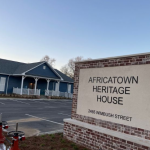By John Sharp, AL.com
A first-of-its-kind museum dedicated to the Clotilda – the last known slave ship – and its 110 survivors officially opened on Saturday, 163 years to the date that the vessel arrived into Mobile Bay.
A dedication of the $1.3 million Africatown Heritage House and “Clotilda: The Exhibition” occurred Friday outside the venue within the Africatown community the Clotilda survivors founded after they were freed from slavery following the Civil War.
“In the grand scheme of the history of the world, that 163 years is nothing,” said Meg McCrummen Fowler, director of the History Museum of Mobile which was charged with the Heritage House’s exhibit and operations. “It’s a moment ago. We are not far removed from its history and the lives and legacies of the 110.”
She added, “They are not distant and remote, but present and still with us.”
Indeed, inside the 2,500-square-foot exhibit is a chronological telling of the Clotilda slave ship’s origins, its survivors and how the Africatown community north of downtown Mobile was settled.
The museum includes a brief history of the transatlantic slave trade that was outlawed in the United States 53 years before the Clotilda’s harrowing 45-day journey with the 110 enslaved Africans from Benin on board.
The museum highlights those survivors and retells the story of its most famous passenger – Oluale Kossola, who is better known as Cudjoe Lewis, and whose interviews in the 1920s provided much of the historical accounts of the Clotilda and its passengers to historians and scholars.
The tragic tales of other ship survivors are highlighted including Matlida McCrear, who died in 1940 in Selman and was the Clotilda’s last known survivor. McCrear’s story including a separation from her mother at a very young age, and an attempted escape from a slaveholder when she was 3 years old. McCrear and her sister “fled into a swamp, hiding there for hours until dogs sniffed them out,” according to a historical account on display within the museum.
“This exhibition is a place to feel the sadness and weight of a wretched part of our shared history and as a place to honor these ancestors, learn their names and celebrate their achievements,” said Fowler. “Their history is all our history.”
Mobile Mayor Sandy Stimpson, who is Republican, acknowledged the recent controversies over retelling controversial Black histories by some conservative lawmakers.
Alabama, in 2021, banned the teaching of so-called critical race theory and limited how educators can talk about race in classrooms.
Stimpson noted that long-sought conversations were occurring between the Clotilda descendants and the descendants of Timothy Meaher, the wealthy steamship owner who financed and illegally smuggled the 110 Africans aboard the Clotilda to Mobile.
“Some say we shouldn’t have conversations about that,” said Stimpson. “I would say to you, the descendants of Africatown and the City of Mobile, we have not only embraced a conversation over the last four years but we did it on a world stage.”
Clotilda Artifacts
The tale of the slave ship and its survivors culminates inside the Heritage House with a display of Clotilda artifacts – ceiling plants, nails, and bolts from the ship – that were recovered after the Clotilda was discovered in May 2019.
“I think those who visit will really learn a lot about this particular story,” said Jeremy Ellis, president of the Clotilda Descendants Association and a sixth-generation descendant of Pollee and Rose Allen who were enslaved and on board the Clotilda. “It tells the story of west African culture, what the 110 experienced at the Middle Passage and the first five-years of slavery and what they overcame in 1865 in the founding of Africatown.”
He added, “It speaks of their courage, resiliency, and tells their individual stories. It’s something I haven’t seen and it’s amazing.”
The museum was the result of a multi-year effort that involved several setbacks due to construction delays and supply chain difficulties in getting the museum under construction.
The costs also increased, requiring additional funding coming from appropriations backed by Mobile County Commissioner Merceria Ludgood. She was credited for spearheading the project and seeing that it got completed.
The project was made possible by a $700,000 appropriation by Ludgood, who diverted tax money from her district’s capital improvement plan to pay for the uptick in capital costs. Overall, the project cost more than double the initial $600,000 cost estimate placed on the project.
The project was also financed with a $250,000 appropriation from the city and $75,000 from the Alabama Power Foundation.
National Media Attention
Ludgood said the idea for the museum kicked off in 2019, a few months after the hull of the Clotilda was recovered from the murky waters of the Mobile River. The ship, after its arrival in 1860, was burned by its captain, William Foster, shortly after the slaves were brought ashore north of Mobile. By that time, the slave trade with other nations had been outlawed for decades, making Clotilda the last known ship to bring enslaved people from Africa to the United States.
“This started with a conversation within the community with people who said they wanted some of the artifacts of the ship on display,” Ludgood said. “But there was nowhere to do it.”
She said initial talks of displaying Clotilda artifacts inside the adjacent Robert L. Hope Community Center of the Mobile County Training School did not go far, largely out of concern that they would not be preserved safely.
“That’s when the idea came, ‘We just go to build something,’” said Ludgood. “From that grew conversations with the History Museum of Mobile. It cannot just be pieces of the shipwreck, but also telling of the story. It was driven by a need of the community identifying their desire to have portions of the ship displayed here, and it kept growing and growing.”
The Heritage House’s official opening is part of an extended weekend event. The Descendants gathered on Thursday to tour the exhibit, and later met to discuss it during a reception at the History Museum of Mobile.
A community day commemorating the anniversary of the Clotilda’s arrival took place on Saturday, and the museum will open to the public on Tuesday.
The weekend of events drew national media attention, and National Geographic has already called the Heritage House the South’s “must-visit museum exhibit” in July.
Ludgood, Ellis and others said the Heritage House’s opening represented a beginning for the community, and not an ending point following the discovery of the slave ship.
Ludgood pointed to the ongoing development of the Africatown Welcome Center, which will be constructed near the community’s historic cemetery. That venue, currently in a design phase, is expected to be a bigger and more expensive facility thanks to $3.6 million in funds collected from penalties from companies involved in the 2010 Deepwater Horizon disaster in the Gulf of Mexico.
Ludgood also said she is focused on assisting with improving the housing stock within the community.
“Once you start getting people back (into Africatown) and invest in new housing stock and opportunities for rehab … it will attract other investment,” she said.










